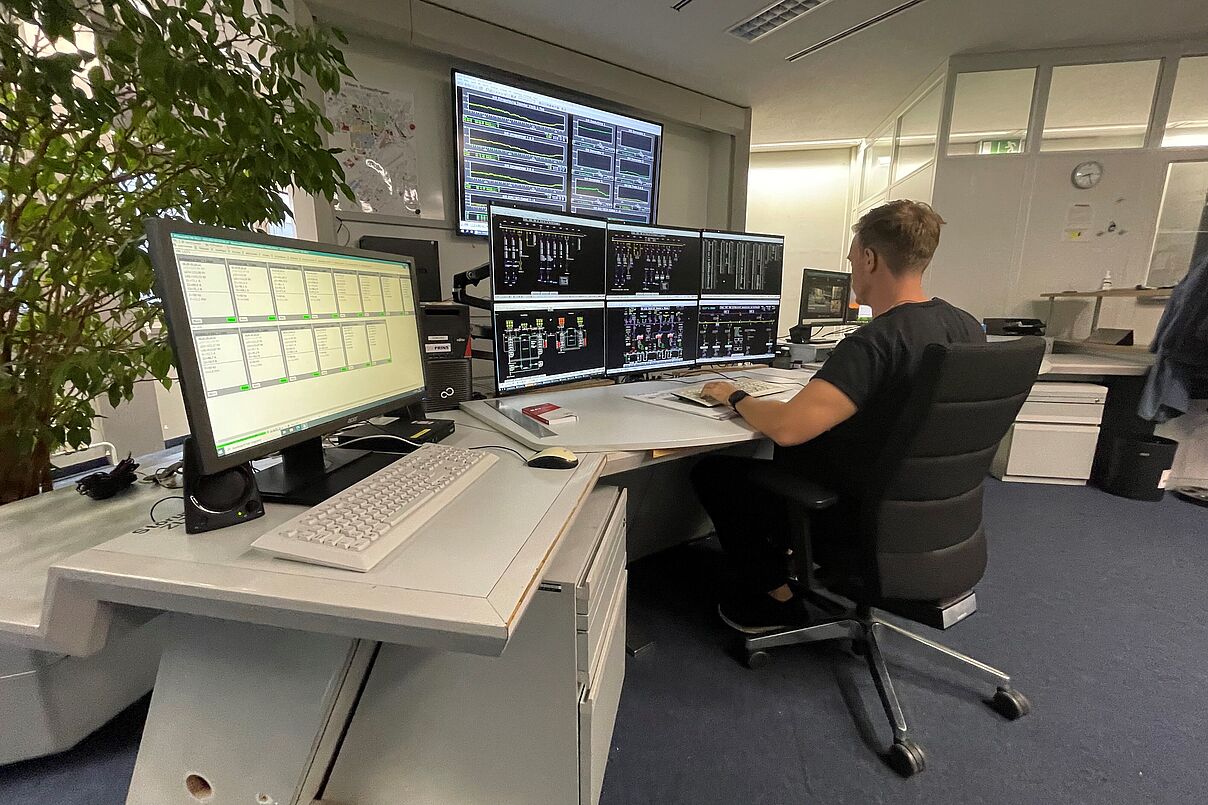
Case Study PSIprins accelerates the workflow at Mercedes-Benz AG
Mercedes-Benz AG has been using PSIprins successfully for over 25 years.
Large industrial corporations with multiple sites, such as Mercedes-Benz AG have a significant energy demand. For this reason, maintaining a stable grid infrastructure and ensuring a reliable power supply has has always been essential to the company's operations.
Until the 1990s, the power grid was monitored and controlled manually. Numerous employees were required on site to record grid values, carry out switching operations, and identify faults in orer to initiate the necessary countermeasures.
With the rising demands of the energy transition and the growing complexity of the grid, this approach became increasingly costly. The clear solution was to implement a control system that could streamline workflows, minimize downtime, and improve profitability. Mercedes-Benz AG has never regretted its decision to adopt a control system from PSI (formerly BTC).
Facts
using PSIprins at Mercedes-Benz AG
Time-saving when troubleshooting problems related to busbars
Comparability of values in the group-wide Mercedes-Benz power grid
The big challenge - achieving the best possible benefit
Mercedes-Benz AG has achieved a number of improvements with the introduction of the control system:
Reducing Workload
PSIprins has digitized manual monitoring and control tasks, making the operations of the grid control center not only more efficient but also more effective.
Rapid resoration of power supply to plants
With PSIprins, Mercedes has cut troubleshooting time for busbar issues from 24 hours to just 3, achieving a significant boost in efficiency and responsiveness.
Facilitating telecontrol
PSI control systems communicate with a wide range of telecontrol protocols. This allowed Mercedes-Benz AG to efficiently integrate the existing telecontrol system into the control system.
CO2 management
The control system enables the integration and monitoring of PV systems, increasing the share of renewable energy and reducing CO2 emissions. In addition, the remote operation of stations and transformers minimizes the need for on-site personnel, which indirectly lowers greenhouse gas emissions as well.
Centralization of power grid monitoring and control for multiple sites
Building on the success of the existing system, Mercedes-Benz AG expanded the PSI grid control system in 2022 to include its Bremen and Rastatt sites. This integration, alongside the major loca-tions in Untertürkheim and Sindelfingen, provides a holistic view of the company’s power grid. Standardizing the control system not only enables consistent measurement comparisons but also streamlines coordination across sites. Furthermore, operating a central control center proves far more efficient than maintaining separate control rooms at each location.

Solution Approach
To improve the quality and efficiency of its power supply, Mercedes Benz recognized early on that large-scale processes could no longer be managed manually. Beginning in the 1990s, the company embarked on a digitalization journey that extended beyond production to include energy supply. Manual processes for monitoring and controlling power grids were replaced with a software-based solution - a fully integrated grid control system.
The most important requirements that the system had to meet at the time - and continues to meet today - are as follows:
- Process efficiency – Faults should be predictable where possible, or at least detected in real time to minimize response times.
- Effectiveness – Fault rectification should be faster and more effective than manual processes, ensuring a highly available power supply.
- Multi client capability – Ideally, the network control system should function across distributed locations (centralization), or at least communicate between sites and provide simultaneous access to the same software.
- Redundancy – The system should continue operating seamlessly in the event of a failure.
- Scalability – The system should support expansion in both the number of locations supplied and the integration of various generation plants (currently exclusively renewable energy) and suppliers.
- Cost efficiency – To reduce acquisition costs, existing technology was integrated into the control system wherever possible rather than being replaced.
… and much more.
Characteristics of the electricity mix at Mercedes-Benz AG
100% green electricity – from
- Solar parks
- Wind farms
- Hydropower
Amount of energy sourced from these:
- Mercedes-Benz's own green electricity concept:
Sourcing is synchronized with consumption – called up every 15 minutes - Jährlich insgesamt etwa so viel, wie 45.000 Haushalte verbrauchen
Verteilung
- Annual total consumption is equivalent to that of approximately 45,000 households.
Source: www. mercedes Benz
